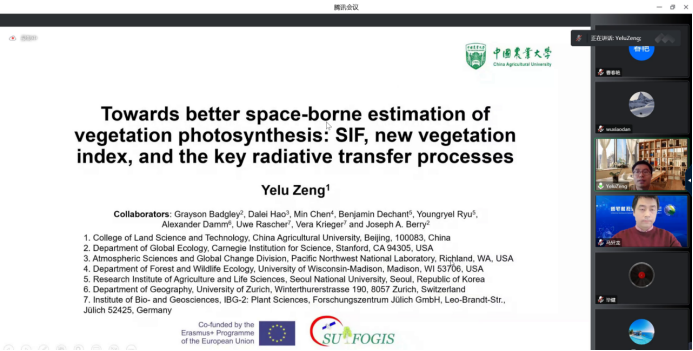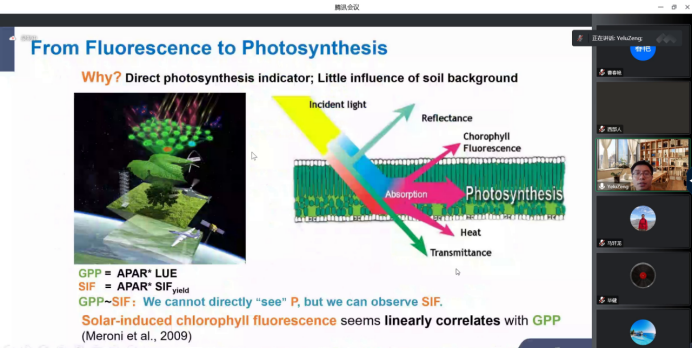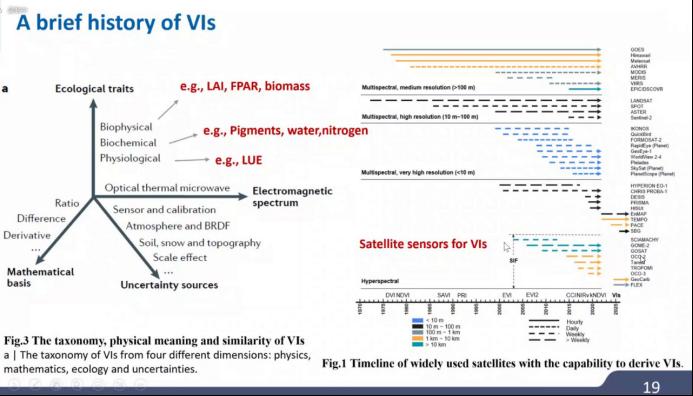At the invitation of Researcher Ma Xuanlong and Professor Wu Xiaodan from the Key Laboratory of Western China’s Environmental Systems, College of Earth and Environmental Sciences, Lanzhou University.Professor Zeng Yelu of China Agricultural University gave an online academic report entitled "Satellite Remote Sensing Monitoring Plant Photosynthesis: Fluorescence, New Vegetation Index and Radiation Transport Process" to teachers and students of our institute. The report was chaired by researcher Ma Xuanlong from the College of Resources and Environment of Lanzhou University, and a total of 152 teachers, undergraduates, and graduate students from Lanzhou University and related universities and research institutes participated in the lecture.

Professor Zeng first explained fluorescence and fluorescence data from basic principles to applications, focusing on the unified model system of three-dimensional SIP radiation transmission based on spectral invariant theory, such as the three-dimensional SIP radiation transmission model system of leaf-canopy, fluorescence-optical analysis, and the angular effect and photon reabsorption effect of fluorescence data in solar incidence-sensor observation, pointing out that SIF data can directly reflect the dynamic changes of actual photosynthesis in plants. Secondly, the inversion method and application of SIF data are explained, and the simple formula of fluorescent photon escape probability in vegetation canopy based on NIRv, and the universal effects of photon escape probability on fluorescence, reflectivity, and vegetation index are introduced. Professor Zeng then introduced the classification system, intrinsic correlation and essential differences of commonly used vegetation index, how to use hyperspectral data and soil spectral shape to reduce the interference of soil background on vegetation index, NIRv-based decoupling method of plant physiology and canopy structure, and how to synergize fluorescence and NIRv vegetation index for environmental stress monitoring such as high temperature/drought/frost. Finally, Professor Zeng summarized and prospected how to understand and use remote sensing signals more accurately and the new model accurately inverted vegetation parameters.


After the presentation, Professor Zeng had a full discussion with a number of teachers and students on the application of SIF data, GPP inversion model, and vegetation index, and looked forward to the development prospects of SIF remote sensing for vegetation from multiple perspectives. This report enriched the students' understanding of the photosynthesis of plants monitored by satellite remote sensing and left a deep impression on the teachers and students present.
Lecturer profile:
Zeng Yelu, a professor at China Agricultural University, is a "35 scientific and technological innovator under the age of 35" in the Asia-Pacific region of MIT Science and Technology Review, and a national high-level young talent. He graduated from Wuhan University with a bachelor's degree, obtained his Ph.D. from the Institute of Remote Sensing and Digital Earth of the Chinese Academy of Sciences, and has served as a full-time postdoctoral fellow and research scientist at the Carnegie Institution in Stanford, the Pacific Northwest National Laboratory in the United States, and the University of Wisconsin-Madison. He has presided over many projects such as the National Natural Science Foundation of China Outstanding Youth Fund (overseas) and published 55 SCI papers. Among them, the first or corresponding author SCI has a total of 16 papers (average IF>10), including Nature Reviews Earth & Environment, etc., and jointly published the monograph "Remote Sensing Cloud Computing and Scientific Analysis". He was selected as the editorial board member and excellent reviewer of Remote Sensing of Environment, the first journal in the field of remote sensing. Since 2020, he has served as the chairman of remote sensing theory at the American Geophysical Congress, won the third "Li Xiaowen Remote Sensing Science Youth Award", and founded the GeoInsider Silicon Valley Remote Sensing Frontier Forum Series with industry influence.